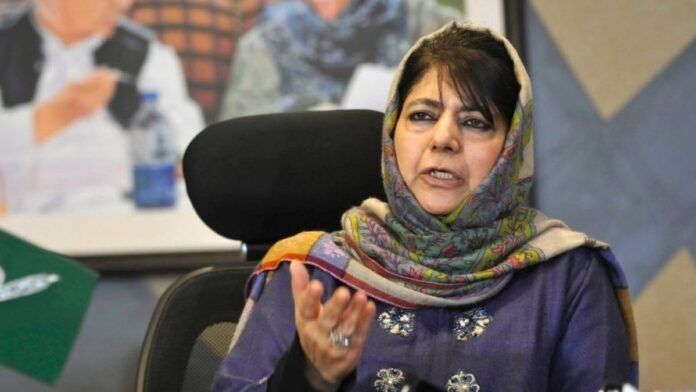The recent FIR filed against Mehbooba Mufti, the Chief of the People’s Democratic Party (PDP), for alleged violation of the Model Code of Conduct during the Kashmir Lok Sabha Elections, has once again highlighted the complex dynamics at play in the region.
Kashmir, with its unique geopolitical and sociocultural landscape, has long been a focal point of political discourse in India. The region’s volatile history, marked by insurgency, conflict, and political instability, has made it a sensitive flashpoint in the country’s democratic framework. Against this backdrop, the FIR against Mehbooba Mufti carries significant implications for the ongoing electoral process and the future trajectory of politics in Kashmir.
The Model Code of Conduct, a set of guidelines issued by the Election Commission of India to regulate the conduct of political parties and candidates during elections, is designed to ensure a level playing field and promote fair and transparent electoral practices. Violations of the Model Code of Conduct, such as using inflammatory language, making false statements, or engaging in corrupt practices, are subject to legal action, including the filing of FIRs.
The FIR against Mehbooba Mufti stems from allegations that she made inflammatory remarks during a campaign rally in Kashmir, violating the provisions of the Model Code of Conduct. The specific nature of the remarks and their potential impact on the electoral process have not been disclosed, but they are believed to have sparked controversy and drawn condemnation from political opponents.
Mehbooba Mufti, a prominent political figure in Kashmir and the former Chief Minister of the state, has been vocal in her criticism of the Indian government’s policies in the region, particularly its handling of the Kashmir conflict and the revocation of Article 370. Her party, the Peoples Democratic Party (PDP), has advocated for greater autonomy and self-governance for the people of Kashmir, positioning itself as a champion of Kashmiri rights within the Indian political system.
The FIR against Mehbooba Mufti comes at a critical juncture in the Kashmir Lok Sabha Elections, with political parties vying for influence and power in a region that remains deeply polarized and politically fragmented. The outcome of the elections could have far-reaching implications for the future of Kashmiri politics and the broader dynamics of India’s relationship with the region.
The filing of the FIR has sparked a heated debate among political commentators and observers, with opinions divided along partisan lines. Supporters of Mehbooba Mufti view the FIR as a politically motivated move aimed at silencing dissent and stifling legitimate criticism of government policies in Kashmir. They argue that Mehbooba Mufti’s remarks, while perhaps controversial, were an expression of her right to free speech and should not be subject to legal action.
On the other hand, critics of Mehbooba Mufti contend that her remarks were irresponsible and inflammatory, potentially inciting violence and disrupting the electoral process. They argue that political leaders have a responsibility to conduct themselves in a manner that upholds the integrity of the electoral process and fosters a peaceful and conducive environment for free and fair elections.
Amidst the swirling controversy, the Election Commission of India has launched an investigation into the matter, seeking to ascertain the veracity of the allegations against Mehbooba Mufti and determine whether any electoral laws have been violated. The outcome of the investigation will likely have significant implications for Mehbooba Mufti’s political future and the broader landscape of Kashmiri politics.
Regardless of the outcome of the investigation, the FIR against Mehbooba Mufti serves as a stark reminder of the complex challenges facing Indian democracy, particularly in regions characterized by political unrest and conflict. As the Kashmir Lok Sabha Elections unfold, it is essential that political leaders and parties adhere to the principles of democracy and respect the rule of law, ensuring that the electoral process remains free, fair, and transparent for all stakeholders involved.

